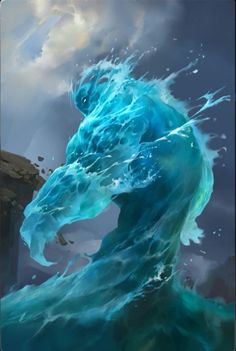Potamoi
Potamoi in Greek Mythology
The role of the Potamoi in Greek mythology
Water was in essence worshiped in Ancient Greece, as without water there would be no life. Water, in later Greek mythology, was said to be the realm of Poseidon, and large sources of water were said to be the realms of major gods such as Oceanus and Phorcys. Smaller water sources, like rivers and springs, though had minor deities associated with them, and in the case of rivers, these deities were the river gods, the Potamoi.
The Potamoi were nominally the 3,000 sons of Oceanus and Tethys, making them brothers to the 3,000 Oceanids. Three thousand was a purely nominal number, as although every river had a god associated with it, there weren’t 3,000 known rivers, and in Greek mythology only about 100 specific Potamoi are mentioned by name.
Although often depicted as men with water-pouring jugs, Potamoi were also thought of as a bull with a man’s head, or as a mixture of man, bull and fish.
As well as being river gods, the Potamoi were also said to be the protectors of the young.
The rivers of the underworld
Given that every river in the ancient world had a river god associated with it, it is perhaps surprising that the most famous rivers in Greek mythology were not even found on the earth’s surface. The underworld, the realm of Hades, had its own recognisable geography, and most notably there were five rivers that ancient sources referred to.
There was the Acheron (river of sorrow), Cocytus (river of lamentation), Phlegethon (or Pyriphlegethon) (river of fire), Lethe (river of forgetfulness), and the Styx (river of hate).
As well as being notable for being in the underworld, two of the rivers, the Styx and Lethe, are noted for not being represented by a god, but by a goddess. Styx was a daughter of Oceanus, but was given the important role as reward for being the first to side with Zeus during the Titanomachy. Lethe was also a goddess, but a daughter of Eris (Strife) and not Oceanus.
Transformation into rivers
Lethe was not the only river deity who was not the offspring of Oceanus and Tethys, and there were several mortals who were transformed, including Evanus. The most famous transformation comes from Ovid in Metamorphoses. Acis was the offspring of Faunus who fell in love with the Nereid Galatea, and although she loved him, Acis was killed by the jealous Polyphemus. Galatea though transformed Acis, or possibly just his blood, into the Acis river of Sicily.
The fighting rivers
The Potamoi were not simply passive deities, and as personification of rivers, they could be angered into violent action. Brychon would fight on the side of the giants during the Gigantomachy against the gods of Mount Olympus, whilst Hydaspes would fight Dionysus during the gods war against the Indians.
Asterion, Inachus and Cephisus also angered Poseidon when they judged in favour of Hera upon the ownership of Argolis; Poseidon in retribution would have the rivers run dry in spells of low rainfall.
Rivers though also famously fought against demi-gods. During the Trojan War, Achilles would insult Scamander, and the river god would subsequently try and kill the Greek hero. Achilles would be rescued by the gods three times, Hera, Athena and the Hephaestus, as Scamander sought vengeance.
Achilles could not best Scamander but Heracles did manage to overcome Achelous when the two wrested for the affection of Deineira. Heracles would break off one of the horns of Achelous, a horn that became the cornucopia.
Love life of the Potamoi
The Potamoi were said to be the fathers’ of the Naiads (fresh water nymphs), many of whom became attendants to Olympian goddesses; Asterion’s daughters indeed became nurses to Hera. Other offspring were forcibly abducted by the gods, as was the case with Asopus’ daughters, including Aegina.
The male gods of Mount Olympus were well-known for their wandering eyes, but the river gods also had an eye for the beautiful females of Greek mythology. Alpheus fell in love with Arethusa, a female huntress, she though wanted nothing to do with the river god, and to avoid his advances was transformed into a spring. That though did not stop Alpheus mating with her; he simply mixed his water with hers.
With water being so important to the ancient Greeks it was only right there were deities associated with each and every one of them.
[1]













